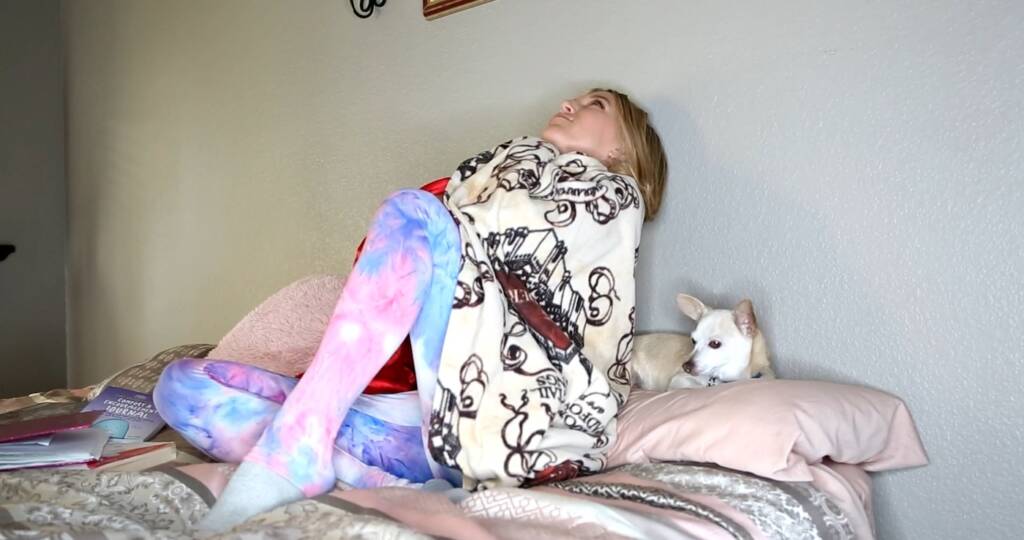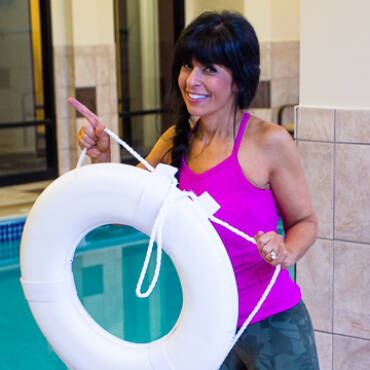It’s the most wonderful time of the year… unless it’s not. If you are already feeling overwhelmed, the notion that you should be jolly, or what can best be described as a sense of “forced merriment,” can result in intensifying feelings of anxiety or melancholy. Taking steps to protect your mental well-being, particularly in this post-COVID era, has never been more necessary. If you are feeling less than joyful this holiday season, know that you are not alone and there are practical and effective strategies that can help.
I asked Amanda Webster, Mind Body Wellness Coach, suicide survivor and founder of Happiness Boost, to share some insights on navigating the mental health trials and burnout that so many people struggle with during the holidays.

*What are some proactive steps people can take to help combat the holiday blues?
Developing coping strategies before the holidays kick in can be extremely helpful. When you have coping mechanisms that are positive and adaptive, you can stave off burnout. Some specific strategies that can help prevent feeling overwhelmed that I recommend are:
· Advocate for yourself and determine what really brings you joy. Learn to say “no” to invitations or rituals that you don’t genuinely want to partake in.
· Nourish your body. Be certain to fuel yourself from the inside out. Focus on eating plenty of whole and nutritious foods amid a season of high sugar and high fat foods that can leave you feeling sluggish and lethargic.
· Keep it moving! Physical activity produces endorphins and boosts your mood. Try to find activities that you genuinely enjoy. If you want to be festive, maybe try ice-skating or, if you’d rather channel your inner Grinch, perhaps kickboxing will do the trick!
· Unplug… literally. Schedule some time daily where you unplug your phone and electronics and take a break from social media.
· Find your tribe. Connect with others, even if it is only virtually, that share similar desire for how they want to celebrate or not celebrate the holidays.

*Are there warning signs to be aware of that could indicate seasonal depression may be striking?
Recognize the early signs of burnout such as fatigue, dissatisfaction with the season, sleep disturbances, or escapism by means of overindulging in alcohol or overeating. These can all signal that it may be time to take action prior to developing more advanced stages of physical and emotional illness, such as chronic exhaustion, depression, anxiety and anger.
· Examine your sleep patterns. Assess your sleep on a weekly basis to determine if you are struggling with insomnia or, conversely, getting a full night of rest and still feeling exhausted when you awaken.
· Raising your glass (or fork)? Raise your awareness as well! When you’re drinking alcohol, whether it’s wine or spiked eggnog, or even if you’re diving into the tin of Christmas cookies, ask yourself if you’re really indulging in an attempt to mask or change an uncomfortable feeling.
*What can you do if visions of sugarplums aren’t dancing in your head and you feel a bit disconnected from all the holiday cheer?
Try to reframe the holidays by banishing your preconceived notions of what the holidays should look like. The holidays don’t necessarily need to be the most important or meaningful time of year. You, ultimately, have control over what is significant to you and what traditions you care to partake in.
· Decide what you want the season to look like. If you’d rather watch a slasher horror film than sit through a Christmas class, cue up a list!
· If anyone in your life is going to base your entire relationship with them on whether or not you partake in a specific ritual, that’s a conversation that needs to be had about boundaries and self-care.
· Make a new tradition of your own, or with a few friends, even if it is not holiday themed.

*What do you suggest for those who find themselves physically exhausted and emotionally depleted?
Making sure that you are caring from your adrenals, and balancing relaxing activities with physical ones, can help you recover from burnout. It can also be extremely helpful to focus on what foods are best to avoid and which ones can be beneficial.
· Working with your natural cortisol cycle, time your meals and snacks to support healthy cortisol and energy levels. Cortisol levels follow a natural cycle that aligns with your circadian rhythm. Typically, cortisol begins to rise around 6:00 a.m. and reaches its highest peak around 8:00 a.m. Throughout the day, cortisol gradually and naturally declines, with small, upward ticks at mealtimes, in order to prepare your body for nighttime rest. Scheduling your meals can be helpful and aim to have lunch as your largest meal and consumed between 11:00 a.m. and 12:00 p.m. Work in a healthy snack between 2:00 p.m. and 3:00 p.m. Dinner should be around 5:00 p.m. to 6:00 p.m. and your last snack should be at least an hour before bedtime, so that your body can focus on rest and rejuvenation, rather than working on digestion.
· Try to avoid processed sugar, alcohol, caffeine, refined carbs/gluten, processed foods, and those foods that contain nitrates, preservatives and artificial colors.
· Strive to consume more nuts, legumes, leafy greens, whole grains, avocados, asparagus, pumpkin seeds, and red and orange fruits.
· Consider taking a magnesium supplement (500 mg daily) as studies indicate that increasing magnesium is linked to reduced occurrence of symptoms of depression.
It may feel like everyone else is merry and bright during the holidays but, unfortunately, seasonal blues are extremely common. Try not to judge the inside of your life against the outside of everyone else’s. Taking some steps to reduce stress and anxiety, particularly at this time of year, is truly a gift that you can give yourself.
To learn more about Amanda Webster and her program, which allows others to take the same steps she did to go from being suicidal and struggling with addiction, to being decertified as having a Serious Mental Illness (SMI) and thriving, you can check out her website at www.amandawebsterhealth.com. She also shares her mental health journey and inspires others on her YouTube channel (youtube.com/amandawebsterhealth) and on Instagram @amandawebsterhealth
If you are struggling and in crisis, there is help available. Contact a suicide prevention hotline here.
About the author: Charlene Bazarian is a fitness and weight loss success story after losing 100 pounds. She mixes her no-nonsense style of fitness advice with humor on her blog at Fbjfit.com and on Facebook at FBJ Fit.




